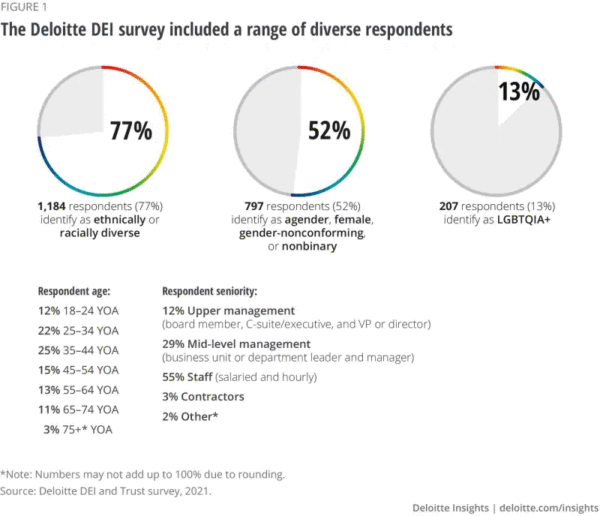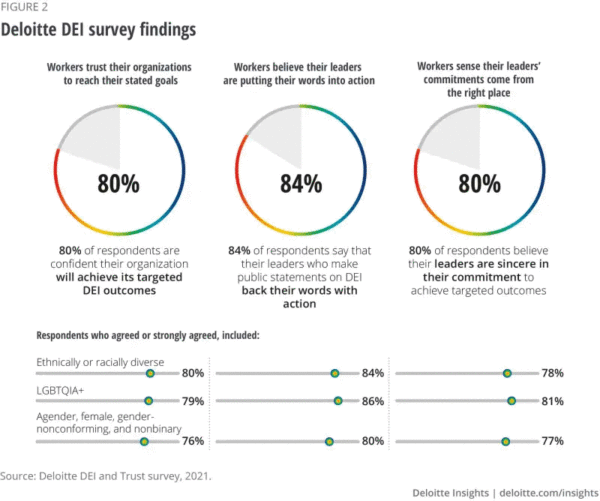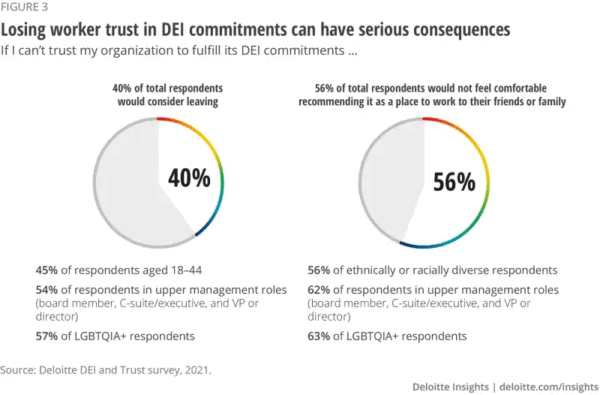Build trust in diversity, equity, and inclusion commitments
January 21, 2022

Since the spring of 2020, many organizations have made public commitments to address societal disparity and injustice, and established or expanded diversity, equity, and inclusion (DEI) initiatives for their current and future workforce. After more than a year of accelerated efforts, the questions arise: Do workers trust their organizations’ commitment and efforts thus far? And how might this change going forward?
Trust can be a critical factor in the relationship between a worker’s performance and operational success. Prior research indicates that if employees cannot trust their employers to fulfill the commitments they have made, their levels of engagement could decrease, and they might become more likely to withhold their best efforts. Alternatively, if employees trust their employer’s commitments, their engagement level can increase up to 20%, and the likelihood they will leave their organization decreases by 87%. Additionally, amid the “Great Resignation,” there have been notable shifts in workers’ feelings about the role of work in their lives and increasing expectations that employers share and reflect their workers’ values, including commitments to DEI.
To understand whether organizational DEI commitments and efforts are improving workers’ trust in their organizations, we surveyed 1,543 workers, mainly respondents who identified as Black, Hispanic/Latinx, Asian, female, and LGBTQIA+. This research looks at these questions from the worker’s perspective, providing insights into how much workers currently trust their organizations’ DEI efforts—their commitment, objectives, and progress—and examines the implications for organizations as they plan their DEI strategies.
What we’ve found in our research is encouraging. Workers, including those who, as part of our survey demographic questions, self-identified as members of diverse populations, currently trust their employers’ DEI efforts. But our research also shows that it would be a mistake to take this trust for granted, and that organizations may already be at risk of drifting off course from the commitments they made. Understanding these twin risks—of failing to meet DEI commitments and the damage this can cause to worker trust—and developing strategies to combat them can help organizations create long-lasting, successful DEI programs, contributing to trust within their workforce.

The good news
Over the past year and a half, many studies have noted workers’ concerns about their organizations’ DEI commitments. Some believe that their employers haven’t set their ambitions high enough; and, perhaps more troubling, others noted that their employers had made promises they weren’t keeping.
Trust begins with making and demonstrating effort. When stakeholders, including workers, perceive an organization as lacking the ability to execute its DEI strategy, or the accountability to fulfill its commitments, their trust in the organization can dwindle. When promises are not kept, perceptions of organizational integrity can erode. This can lead an organization to develop a reputation for performative activism: the perception among stakeholders that the organization is involved in activism primarily for image enhancement without genuine commitment to back it up.
Despite these pitfalls, however, our survey results (figure 2) indicate that some organizations are learning how to earn their workers’ trust, and that, by and large, workers do currently trust their organizations’ and leaders’ commitments to DEI and their ability to execute successful DEI programs. Significantly, these results are consistent across demographic groups.

The consequences of not following through
While many organizations appear to be making strides in assuring workers of their sincere intent and their capability to deliver on their commitments, history suggests continued trust is not guaranteed. The work should be ongoing to maintain trust levels. Organizations that allow “commitment drift”—defined by Elizabeth Doty and Maryam Kouchaki as “perceived systematic breakdowns in keeping an organization’s most important commitments to its stakeholders”—are likely to erode stakeholder trust and eventually the benefits that trust creates.
Falling prey to the pressure of short-term business imperatives can cause leaders to back out of even the most well-intentioned commitments. Organizations that have already enacted DEI commitments (and those that are preparing to) should view their DEI program as part of their long-term strategy. This can help them to avoid diminishing or squandering their hard-earned trust by not completely institutionalizing DEI or making it a foundational element of the organization’s purpose and strategy.
Results from our research indicate the potential for regression is real. More than 40% of respondents in upper management roles (board members, C-suite/executive, and VP or director) say their organizations are too focused on DEI. Furthermore, more than 60% of this upper management group believe that their organizations’ commitment to DEI will likely subside as different competitive threats emerge. This is reflected in worker perception: Nearly 40% of total respondents—including 41% of ethnically or racially diverse respondents and 50% of LGBTQIA+ respondents—also believe that this commitment drift is likely to happen.
Another challenge organizations can face in maintaining DEI progress and trust is losing leaders and staff who promote, drive, or enforce accountability for DEI efforts. Chief diversity officers, in particular, have been actively recruited, tenures have in some cases been quite short. That has been largely attributed to burnout due to high expectations with inadequate resources, and a disconnect between DEI efforts, business objectives, and support from other executives. A short tenure of a chief diversity officer can signal to workers that their organization is either not prioritizing DEI or not sufficiently supporting it.
Losing the trust workers have in organizational DEI programs can have bottom-line consequences for organizations (figure 3). If these sentiments become reality, the damage to employer brands could be a turn too far on the vice grip on organizations in an already-tight talent market.

These results can serve as a warning about the potential damage to organizations’ employer brands in a challenging talent market. When workers don’t trust organizational commitments to DEI, they are more likely to consider quitting and not referring others, and prospective hires are more likely to not apply for open roles.
Beyond the workforce, breaches in DEI-related trust can trigger actions that impact relationships with other stakeholders and firm performance. For example, consumers often make decisions about whether to purchase a product based on their perceptions of employee treatment and DEI commitments. One recent study notes that 28% of respondents would stop doing business with a company that treats its employees poorly, and 25% would stop if the company didn’t commit to DEI. Investors are also are paying attention to organizational corporate social responsibility programs, which often include DEI. A growing body of research acknowledges that investment risk is lower for organizations that adhere to ethical principles.
Adopt a holistic, collaborative approach that will stand the test of time
Leaders responsible for building a DEI strategy and delivering on its commitments know the work and resources that have gone into the journey so far, and they’ve shown they can build considerable trust with their workers. But how can organizations maintain that trust―not dropping the ball, reducing attention to DEI efforts in the face of other emerging issues, or extending their promises past the point that they can deliver?
We asked respondents to offer ideas on how their organizations can build trusted DEI programs over time, and who within the organization should be accountable for different elements of a successful program. Their perspectives and recommendations include the below points.
Increase and maintain worker trust by demonstrating competence and intent
We gave respondents a blank slate to tell us what their organizations could do to directly increase their employees’ trust in their organization’s commitment to meaningful DEI outcomes. We found that more than 20% of those surveyed believe their organization is on the right path and mainly needs to keep pushing on current efforts, and 70% of respondents identify several different opportunities for their companies and leaders to consider. We then categorized the suggestions under the broader elements of trust: competence and intent.
Competence
Nearly half of workers who participated in our research want to see their organizations take more focused action to build greater trust in organizational DEI efforts. Some of the most frequent recommendations on competence were:
- Solicit input and involvement from all employees throughout program phases and cycles
Set clear, well-researched goals, especially those that address challenges faced by diverse groups within the organization - Commit funding for expertise, personnel, and programs that demonstrate and reflect the strategic importance of this work
- Increase accountability and demonstrate this by regularly communicating evidence of progress
- Stay committed in the long term to hiring, training, and promoting from diverse groups, including for leadership roles
Intent
Nearly a quarter of respondents in our survey are looking for organizations and their leaders to demonstrate a genuine commitment to DEI initiatives. Some of the most frequent recommendations were:
- Be honest and sincere about what you are doing and why
- Always be transparent when communicating motivations, progress, momentum, and even mistakes
- Support and model DEI goals and outcomes at the leadership level
- Create a psychologically safe environment in which people can speak freely about their experiences and thoughts
- Maintain focus on DEI even as other business imperatives arise, and show that you are doing so
Consider everyone’s role in moving from vision to results
Whether they are executive leaders, HR managers, functional or line managers, or staff, everyone has a role to play in supporting their organization’s DEI programs. Even the board plays a role—more than 90% of respondents agree. Our respondents categorized the different roles that leaders and workers have in DEI effort deployment. Some of these roles are particularly crucial in certain stages, whether it’s sponsoring and setting the vision, providing expertise to further success, driving accountability for results, or participating and engaging with DEI initiatives. We see opportunities for people in these roles, during these key stages, to augment worker trust. We also think it’s important to note that each of these leaders or groups need not attempt to drive progress in a vacuum—nor should they. DEI programs with goals and metrics that are shared across business leaders and departments, outside the potential silos of the HR or DEI units, are often more successful.
Collaborate at every stage
Figure 4 shows opportunities suggested by our analysis for how different stakeholders within the organization can play a part in DEI programs to enhance trust.
Figure 4. Survey respondents shared how different roles within an organization can contribute to diversity, equity, and inclusion efforts to build trust

Embrace a journey without a finish line
Our research indicates there is trust today among the workforce in their organizations’ DEI commitments, and that is encouraging. Yet, there is no finish line to DEI: There’s always room to grow and improve. Companies can continue to learn from their experiences, successes, and failures as they seek to make their workplaces more inclusive and equitable for all. They have it within their power to demonstrate that they are genuinely committed to and will make ongoing progress against their organizations’ current and future DEI vision and goals.
Delivering on DEI commitments and fueling worker trust can help demonstrate that an organization’s values align with those of its stakeholders. Organizations that collaborate with their workers on DEI initiatives continue to fuel their DEI journey, which can help them avoid lapsing into commitment drift or other challenges. It is typically through collaboration and trust that an organization and its workers will achieve the purpose and goals of the business, generating value for all stakeholders.






























